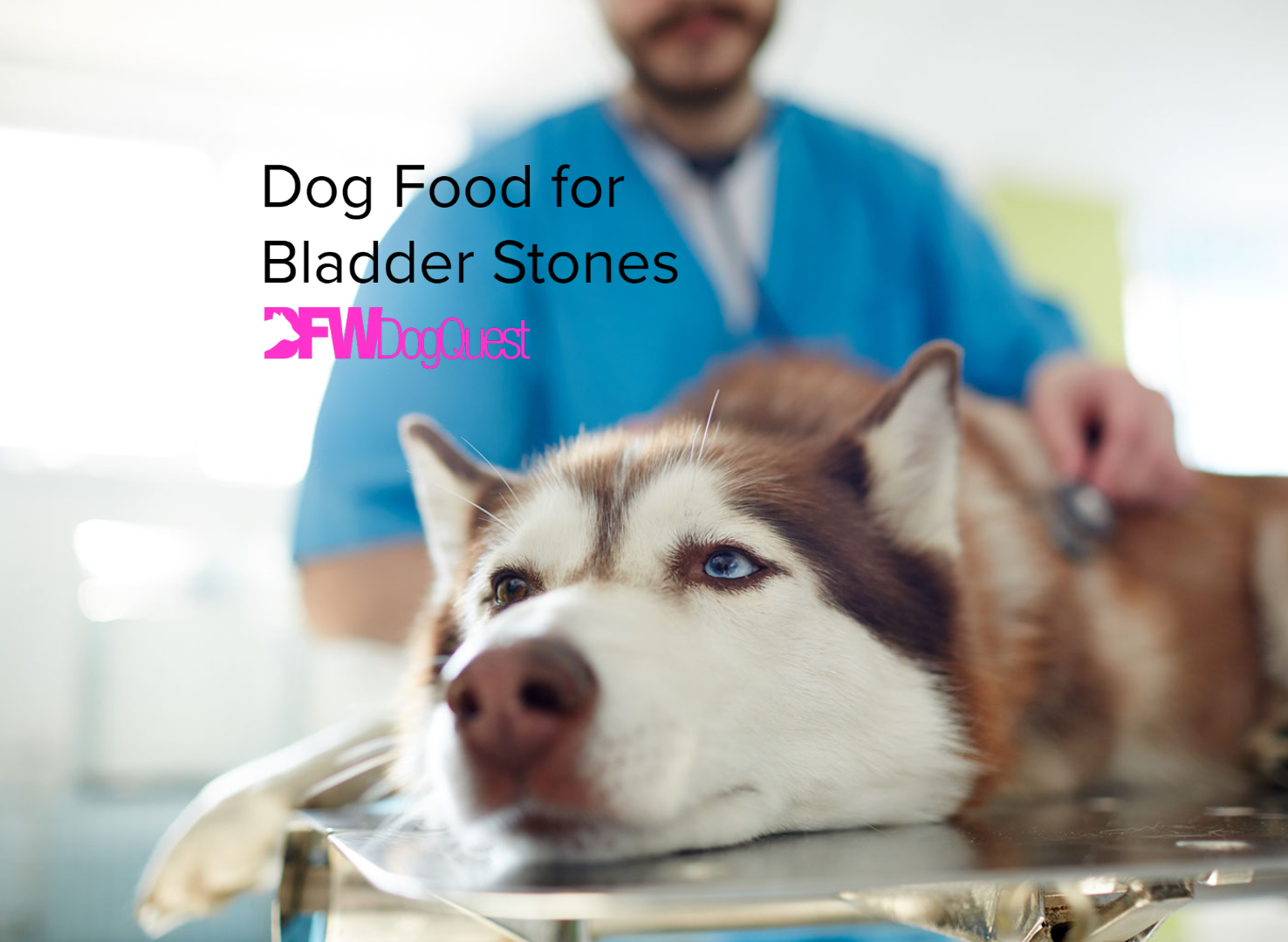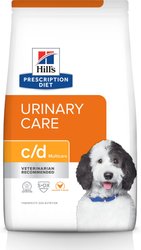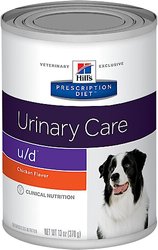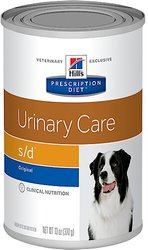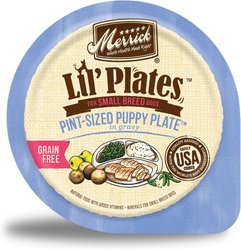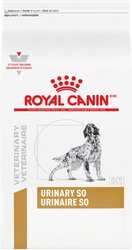Bladder stones also happen to dogs, just as they do to humans. They are usually caused by some urinary tract infection, which forms stones or crystals in your dog’s bladder, which eventually make them troubled when peeing.
Urinating problems can be a very straining experience for your dog. Your vet may recommend not just medicine if they diagnose your dog with bladder problems, but may also give you advice on dog food.
Things to Consider Before You Buy
If you want to buy the best dog food for bladder stones, you may need to consider these frequently asked questions first:
What are the causes of bladder stones on dogs?
Bladder stones are usually caused by one or more of the following:
- The dog’s breed.
Usually, if your dog is one of the breeds who are more likely to have bladder stones, then it could be a bit of bad news for you.
Dog breeds who are likely to have bladder stones are the following: basset hound, welsh corgi, pug, miniature schnauzer, Dalmatian, Pekingese, cocker spaniel, dachshund, bulldog, Shi Tzu, and a beagle.
The usual reason for this is that most of these dog breeds are prone to abnormal urine pH levels as well as their genetic history. They also tend to be more prone to urinary tract infections.
- Getting dehydrated.
If your dog doesn’t get the hydration that they need, their pH levels may be unbalanced. This can have an effect on their metabolism rate as well as on their overall diet plan.
If their pH levels become unbalanced, crystal stones can form in their bladder. The ideal pH level of urine for dogs should be at least lower than pH level 7 so that it will be able to dissolve the crystals that form in the bladder.
- Bacterial infection.
In some cases, if your dog suffers some bacterial infection then they can possibly be more susceptible to getting bladder stones. Consider asking your vet to get your dog examined to know if they have a bacterial infection that may possibly be the cause of the bladder stones.
What are the symptoms of bladder stones on dogs?
The most common ways to tell if your dog has bladder stones are through the following signs and symptoms:
- Your dog has discolored the urine. Check your dog’s urine every time they go outside. If the color is not the usual one then that may be a sign, just like when humans get urinary tract infection.
- The dog licks on their urinary opening. They may start to itch in this area, and hence, they tend to lick it to help ease the itch or pain.
- Your dog finds it difficult to pee.If your dog finds a lot of trouble peeing, such as taking a long time to pee than usual, that might be a sign of bladder stones for dogs.
- Accidents happen more often. If your dog’s peeing is uncontrollable and they tend to make accidents in the house (when they shouldn’t be since you’ve trained them), that may also be a sign of an uncontrollable bladder.
- Trying to pee more often but not much urine comes out. This also happens in most humans who have bladder stones or urinary tract infection. Consider measuring your dog’s urine in a measuring cup or just observe it when they are urinating.
- Staying in the peeing position for a long period of time. If your dog takes a long time to pee, note if they are actually peeing or just standing there trying to pee but it takes a significantly longer amount of time to do so.
- Some blood may be present in the urine. Inspect the urine for any traces of blood, which usually comes from urinary tract infections as well.
- They may lose appetite. Your dog may possibly lose their appetite because of the inability to pee well and due to their anxiety over trying to urinate.
- The dog may vomit occasionally. In very rare cases, dogs who have bladder stones may also possibly vomit, but this depends on the severity of the condition.
- Your dog may feel pain while peeing. Aside from taking a long time to pee, some dogs may find it painful to urinate on their own unlike they usually do.
How are bladder stones diagnosed?
To find out if your dog has bladder stones, your vet may recommend any of the following tests:
- Abdominal ultrasound – this tries to find out if there are stones or crystals in your dog’s bladder. This is one of the most common ways of finding out about bladder stones in dogs.
- Urinalysis – also a very common way of finding out about bladder stones for dogs, it helps to know if there are urinary tract infections on your dog that may cause bladder problems.
- Stone analysis – this tries to determine if the stone in your dog’s bladder that passed into the urine is definitely causing the bladder problems.
- CBC – a complete blood count can be performed if you see some blood on your dog’s urine. This is to rule out any possibility of your dog getting any blood-related disease or condition.
- X-ray – your dog can also get a simple x-ray to know if there are stones or crystals in their bladder, near their abdomen.
- Thyroid test – although a little pricier, this one can be important if your dog has a family history of thyroid problems. In cases that your thyroid is producing too little hormones, this may actually affect their bladder health at some point.
- Electrolyte test – this may determine if your dog is getting the right hydration that they need. After all, dogs only bark so the only way to tell if they are physically and scientifically dehydrated or not is through an electrolyte test.
What are the benefits of dog food for bladder stones?
If you choose your dog food appropriately for a dog with bladder stones, you are bound for the following benefits:
- It helps your dog recover faster. Dogs who eat a healthy diet that is made for bladder stones can possibly recover much faster than dogs who only depend on medicine. This is why you should work closely with your vet to choose the appropriate dog food for them with their given condition.
- You are keeping your dog’s hydration at the right level. Because bladder stones are problems that require your dog to keep them hydrated, you should consider choosing the right food. Dog foods that are rich in hydrating ingredients are more advisable so that you can balance your dog’s pH levels in their urine to help dissolve the current bladder stones faster than with meds alone.
- It may also help prevent future formation of bladder stones. Dogs who are more susceptible to bladder stones may also have them again and again in the future, so prevention by eating the right dog food to prevent these bladder stones from forming is a good measure.
How do I choose the best dog food for bladder stones?
To choose the right dog food for your pet who has bladder stones, you need to consider the following:
- Type of stone that they have – your vet may advise you on which kinds of foods are applicable for your dog depending on the type of bladder stone that they have. There are different kinds of bladder stones and different food are more applicable for some of them since they may take a longer time to dissolve.
- Moisture or water levels – keeping your dog well-hydrated is important if they have bladder stones, so consider food with a lot of moisture or water levels to help with their water intake.
- Fresh ingredients – especially if your dog has allergies to certain food types or if they have a sensitive stomach, they should be fed with dog food that is free from preservatives and other additives.
- Your vet’s advice – listen closely to your vet’s advice on dog food suggestions. They may recommend a brand that’s perfect for your dog.
- Your dog’s age and size – some dogs who are older may also tend to digest food differently, so they should be fed something that has a different ingredient list. Look for dog foods that are for all ages if you are unsure.
This is why you may need to look for the best dog food for bladder stones.
Top 5 Best Dog Food for Bladder Stones
Here are our top picks and suggestions for the best dog food for bladder stones:
1. Hills Prescription C/d Urinary Care 8.5lb Canine
As a urinary care dog food, this one has a chicken flavor and contains 8.5 lbs in one bag.
This one is rich in magnesium, phosphorus, and calcium, all of which are beneficial to your dog’s system, especially with their urinary tract infection.
What’s more, it is also rich in omega-3 fatty acids for better digestion without a lot of sodium content and fat so that it will keep your dog in a healthy state.
2. Hill’s Prescription Diet u/d Chicken Flavor Canned Dog Food
Also ideal for urinary problems, this dog food comes in a can at 13 ounces each. With a chicken flavor that your dog might enjoy, it contains the right minerals which can balance your dog’s pH levels to reduce the bladder stone creation.
If your dog has urinary crystalline problems, they may benefit from this dog food, as it is a vet-recommended product.
What’s more, it also has benefits to their immune system and cell oxidation due to the antioxidants. The protein and calcium levels are in the right levels to keep bladder stones from forming.
3. Hill’s Prescription Diet s/d Urinary Care Original Canned Dog Food
Coming in its original flavor for dogs who are prescribed to eat such food by their vet, this 13-ounce can of dog food has balanced amounts of magnesium, phosphorus, and protein so that it can limit bladder stones and crystals from forming.
4. Merrick Lil’ Plates Grain Free Small Breed Wet Dog Food
Deboned chicken is the first ingredient in this puppy plate. Each pack of this dog food contains 12 puppy plates at 3.5 ounces each, so they can be easily fed on the go.
5. Royal Canin Urinary SO Dry Food
Like a bag of dry food for dogs, this can be helpful for those with urinary tract infections even though it is dry dog food. It comes in a 5.5-lb bag and can also work well for dogs with kidney problems.
Dogs with bladder stones can possibly benefit from it, especially breeds like huskies and Dachshunds. You can find more food options for huskies here.
Ideal for adult dogs, it uses its Relative Super Saturation (RSS) methodology to help balance the urine’s pH levels to help reduce the stone formation.
Conclusion
The clear winner of our roundup is the Hill’s Prescription Diet u/d Chicken Flavor Canned Dog Food for the best dog food for bladder stones.
It is wet dog food, which is ideal for dogs who need a lot of hydration due to their bladder stone problems to balance out their pH levels in their urine. It also has a balanced level of both calcium and protein so it doesn’t form crystals in your dog’s bladder.
While other dog foods were worth mentioning, some of them may not be ideal for very serious bladder stone cases, and your vet may advise more wet food than dry food, although our dry food suggestions can still be recommended by some vets depending on your dog’s condition.
